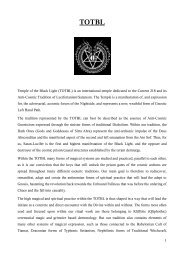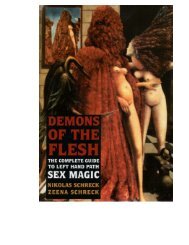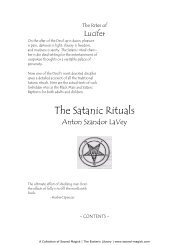Satanism Today - An Encyclopedia of Religion, Folklore and Popular ...
Satanism Today - An Encyclopedia of Religion, Folklore and Popular ...
Satanism Today - An Encyclopedia of Religion, Folklore and Popular ...
Create successful ePaper yourself
Turn your PDF publications into a flip-book with our unique Google optimized e-Paper software.
Shakespeare 247<br />
Semyaza<br />
Semyaza (also known as Semjaza, Semiaza, <strong>and</strong><br />
other variant spellings) was the leader <strong>of</strong> wicked<br />
fallen angels who led 200 other angels to earth to<br />
mate with mortal women there. These angels also<br />
encouraged other sinful activities by teaching<br />
humans about such things as cosmetics (for<br />
women)—encouraging vanity—<strong>and</strong> weapons (for<br />
men), to use in engaging in battle with each other.<br />
This is according to the Book <strong>of</strong> Enoch, which<br />
goes on to describe how the mortal women gave<br />
birth to many giants who were so huge that they<br />
ate all the food on earth, then went on to eating<br />
humans, <strong>and</strong> eventually started to eat each other.<br />
When earth was in complete anarchy, God sent the<br />
archangel Michael down from heaven to confine<br />
the corrupt angels in the valleys <strong>of</strong> earth until<br />
doomsday. The giants that these angels had<br />
fathered were destroyed, but their evil spirits went<br />
on wreaking havoc until they were wiped out by<br />
the Flood sent by God. According to Hebrew<br />
Myths, by Robert Graves, Semyaza is now eternally<br />
residing in the sky in the form <strong>of</strong> the constellation<br />
Orion, hanging between heaven <strong>and</strong> earth, with<br />
his head pointing downwards.<br />
See also Fallen <strong>An</strong>gels; Nephilim<br />
For Further Reading:<br />
Davidson, Gustav. A Dictionary <strong>of</strong> <strong>An</strong>gels Including<br />
the Fallen <strong>An</strong>gels. 1967. New York: Free Press,<br />
1971.<br />
Ronner, John. Know Your <strong>An</strong>gels: The <strong>An</strong>gel Almanac<br />
with Biographies <strong>of</strong> 100 Prominent <strong>An</strong>gels in<br />
Legend <strong>and</strong> <strong>Folklore</strong>, <strong>and</strong> Much More.<br />
Murfreesboro, TN: Mamre, 1993.<br />
Serpent’s Lair<br />
In this 1995 film a young couple seems destined to<br />
live happily ever after when they move into their<br />
new home. The husb<strong>and</strong>, however, has the bad<br />
judgment to become involved in an affair with a<br />
Satanic seductress.<br />
The Seventh Victim<br />
A woman seeking to find her sister in Greenwich<br />
Village discovers that she is part <strong>of</strong> a Satanic cult.<br />
There is a shower scene in this 1943 film that is said<br />
to be the inspiration for the shower scene in Psycho.<br />
Shaitans<br />
Shaitans are evil spirits with cock’s feet in Hebrew<br />
<strong>and</strong> Arabic mythology. In the Islamic faith, angels<br />
guard the walls <strong>of</strong> heaven to prevent shaitans <strong>and</strong><br />
other evil spirits from eavesdropping. When one<br />
shaitan appeared before the prophet Muhammad,<br />
however, the prophet began to teach the spirit<br />
from the Koran so that he might begin to get right<br />
with God.<br />
See also Islam; Jinn<br />
Shakespeare<br />
Born in Stratford-upon-Avon, the English poet <strong>and</strong><br />
dramatist William Shakespeare (1564–1616) wrote<br />
his plays exclusively for the theater company with<br />
which he worked. Some <strong>of</strong> his plays were printed<br />
from texts reconstructed from memory by the<br />
actors, while others were supplied to the printer by<br />
the company. Among his well-known works are the<br />
English history plays Richard III, King John, Richard<br />
II, <strong>and</strong> Henry V; the comedies The Merchant <strong>of</strong><br />
Venice, A Midsummer Night’s Dream, Much Ado<br />
About Nothing, As You Like It, <strong>and</strong> Twelfth Night; the<br />
tragedies Julius Caesar, Hamlet, Othello, King Lear,<br />
Macbeth, <strong>An</strong>tony <strong>and</strong> Cleopatra, <strong>and</strong> Coriolanus; the<br />
plays Troilus <strong>and</strong> Cressida, Cymbeline, The Winter’s<br />
Tale <strong>and</strong> his last play, The Tempest.<br />
In his earliest plays, including the historical<br />
Richard III, King John <strong>and</strong> Richard II, Shakespeare<br />
was particularly concerned with the tragedy <strong>of</strong><br />
character <strong>and</strong> personal downfall, whereas he<br />
became more interested in evil as an external force<br />
working against man in the series <strong>of</strong> tragedies<br />
initiated with Hamlet <strong>and</strong> terminating with<br />
Macbeth. Hamlet, Macbeth, Othello, <strong>and</strong> King Lear<br />
can be regarded as eschatologically oriented since<br />
they investigate the theme <strong>of</strong> salvation <strong>and</strong><br />
damnation, although with four different perspectives.<br />
In Macbeth, Shakespeare deals with the bad<br />
man who remains evil <strong>and</strong> goes to merited<br />
damnation, whereas in King Lear the wicked<br />
repents, leads a new life, <strong>and</strong> finally receives salvation.<br />
In Hamlet <strong>and</strong> Othello, respectively, the<br />
possibilities are that the good man resists evil <strong>and</strong><br />
achieves the salvation, or that he succumbs to the<br />
temptations <strong>of</strong> the Devil <strong>and</strong> is finally damned.
















